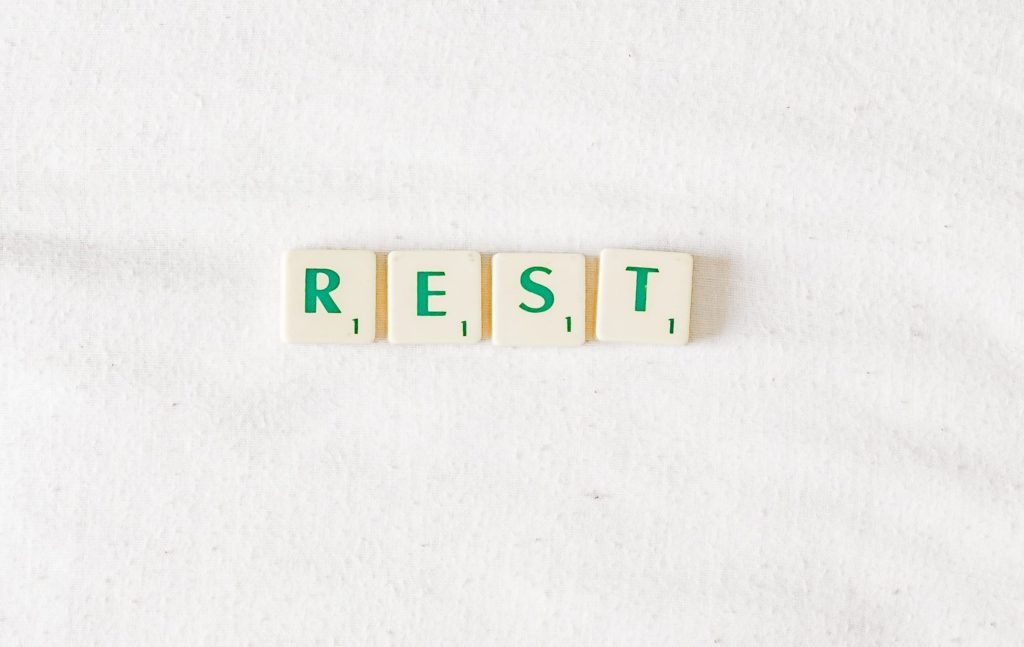How to Take Rest Days Guilt Free

Do you struggle to take rest days?
If so, I understand. You love training. Me too.
It’s solidified into your daily routine. You feel great after you finish your workout, and you feel a bit off when you’re away from the gym.
I’ve been there. I used to really struggle with taking rest days, but don’t skip them.
If this sounds like you, you’ll need to change the way you think about rest days.
You shouldn’t feel guilty for taking days off. You also shouldn’t feel like you’re missing an opportunity to make progress. It’s actually quite the opposite.
Rest days allow for progress to be made. This is when muscles are being repaired and rebuilt to become bigger and stronger. This is when tendons, ligaments, joints and your central nervous system get a much needed break from hard training.
Without enough rest and recovery, you increase the likelihood of injuries, and reduce your chances of maximizing muscle growth. You could also run into nagging aches and pains that get in the way of your training, preventing you from performing at your very best and getting the results you want.
Without enough rest and recovery, you’ll likely burn out and have a hard time keeping up with your training.
Being extremely consistent and sustaining high levels of training intensity will be difficult.
Over time the fatigue will accumulate and the negative effects that come with insufficient rest and recovery will be noticeable.
Related: “How to Deload: Do Less to Gain More Muscle and Strength”
Not only is rest essential for the body, but the mind as well.
Consistently training hard and being in the state of mind that’s required to push your body to it’s limits with a high level of focus can be mentally taxing. A change in your environment and spending some time away from the gym is helpful mentally. There’s a good chance you’ll notice a boost in motivation after spending some time recovering outside of the gym instead of constantly training.
If you’re looking to make health and fitness a part of your life and you’re in it for the long-haul, you’ll need to get enough rest. Yeah, you can probably train 7 days a week for a couple of weeks, but forever? No, that’s highly unlikely if you’re truly training hard. If you try to do it, you’ll eventually feel run down, both mentally and physically.
So, to make taking rest days less of a challenge, it’ll help to change the way you look at them.
Rest Days Are Growth Days
Training is the stimulus that initiates the muscle-building process. Muscle hypertrophy actually takes place when you’re resting and allowing your body to repair and recover.
Enough rest and recovery is what allows your muscles and central nervous system to adapt to the stress placed on them during previous training sessions. Your body adapts by making muscles larger and stronger in order to handle the increased workload.
If you’re constantly training hard and not recovering enough, muscle growth will be hard to come by. When you disrupt recovery, there’s a good chance you’re also disrupting the muscle-building process.
So, think of rest days as growth days.
Do what you can to expedite recovery and maximize your body’s ability to build muscle.
Get 7-9 hours of quality sleep. This is when most of the repairing and rebuilding of muscle tissue occurs. Without enough sleep, your energy will be low and your body won’t be in an optimal state of hormonal balance. This will make it difficult to recover from the previous training session, and you won’t be properly prepared for the next one.
Drink plenty of water, stretch, foam roll, and do some mobility work and light physical activity to increase blood flow and alleviate any stiffness. Do activities that you enjoy, help you relax, and reduce stress levels.
It’s also important to eat enough food. Yes, even on your rest days.
You should still be in a calorie surplus with enough carbohydrates. Continuing to eat carbohydrates on your recovery days will help replenish muscle glycogen stores and keep them full. This will help you refuel from the previous training session and prepare for the next one.
Rest Days Are Part of The Training Program
Just like you have training days, you also have recovery days.
Instead of thinking of your days off from the gym as a day you don’t get to train, think of your rest days as the days you get to place more focus on the recovery aspect of your training program.
Without proper recovery, the quality of your workouts will suffer and your program won’t be as effective. Your training program is almost useless if you can’t recover from your training sessions.
If you’re constantly working at a high level of intensity without enough rest days, you could end up exceeding your body’s ability to recover, which could potentially result in a continual over stressed and catabolic state. Stress hormones will be high, and testosterone levels will drop. This could result in poor sleep, which can further worsen recovery. Your hormones regulate so much that goes on in your body. Make sure you’re doing what you can to put yourself in a hormonal state that is conducive to your goal of a leaner, more muscular, and stronger body.
Many people understand that rest is important for letting your muscles, joints, tendons, ligaments, and central nervous system recover, but your immune system often gets overlooked. Exercise in moderate amounts, whether it be resistance or cardiovascular training, increases immune function. However, intense training is a stress to the body, triggering the release of hormones that are associated with stress like cortisol, epinephrine, norepinephrine. Intense training actually temporarily reduces immune function. After an intense training session, stress hormones are high, and your white blood cell count—the key players in your immune system—is low. Don’t worry, the suppression of your immune system is temporary and can be restored by consuming enough carbohydrates after training and getting enough rest. But too much training and stress on the body combined with inadequate amounts of rest and recovery can suppress your immune system to a greater degree, further worsening recovery and increasing your likelihood of getting sick and missing workouts.
Final Thoughts
Not experiencing any soreness or simply feeling good doesn’t always mean you’re recovered and in an optimal state—both physiologically and psychologically—for building muscle and increasing strength. Think about it more systemically. It’s not just muscle that needs to recover. Your nervous, immune, musculoskeletal, and hormonal systems all need enough time and energy in order to recover and be an optimal state. When your mind and body is functioning at a high level and firing on all cylinders, you can maximize your results from all the effort you’re putting in at the gym and in the kitchen.
Spend your rest days doing something else you enjoy. Use this time to do the things you’d normally tell yourself you don’t have time to do. You could meal prep, spend time with friends and family, get more work done on your side hustle, study more, do some light walking outdoors, or clean up around the house and reorganize.
Don’t skip your rest days. Instead, change the way you view them. Spend your time wisely, and realize that in the long run, you’re better off taking them.
Think of your rest days as growth days and consider your rest days as the days you get to focus on the recovery aspect of your training program.
